人教版B8 Unit 4 Pygmalion Workbook课件40张
文档属性
| 名称 | 人教版B8 Unit 4 Pygmalion Workbook课件40张 |  | |
| 格式 | zip | ||
| 文件大小 | 1.6MB | ||
| 资源类型 | 教案 | ||
| 版本资源 | 人教版(新课程标准) | ||
| 科目 | 英语 | ||
| 更新时间 | 2015-05-26 17:35:21 | ||
图片预览

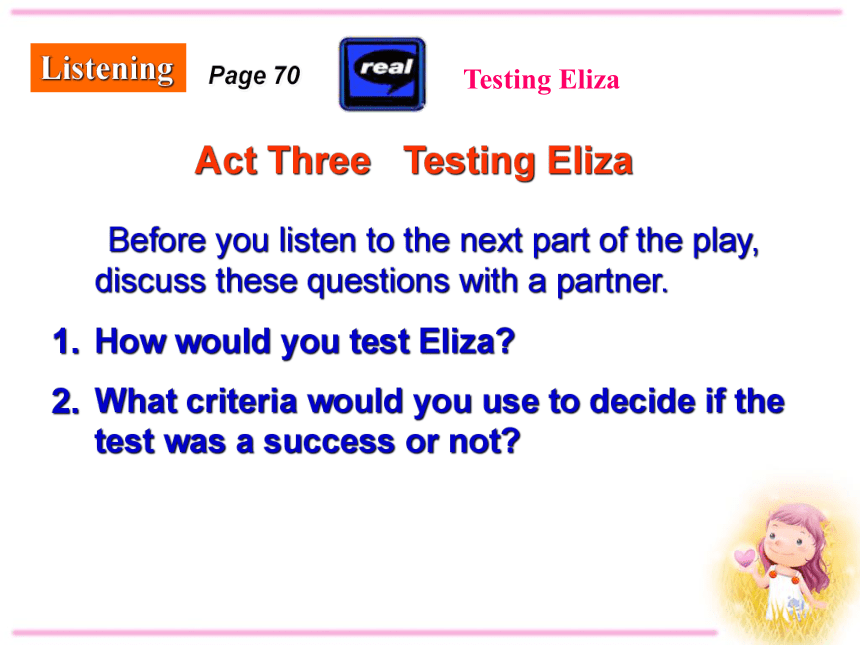




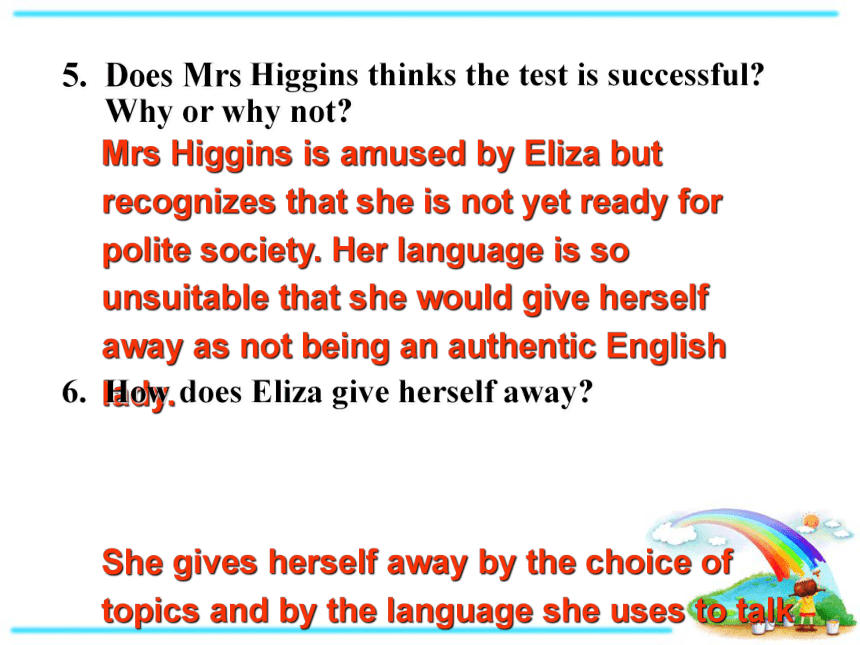


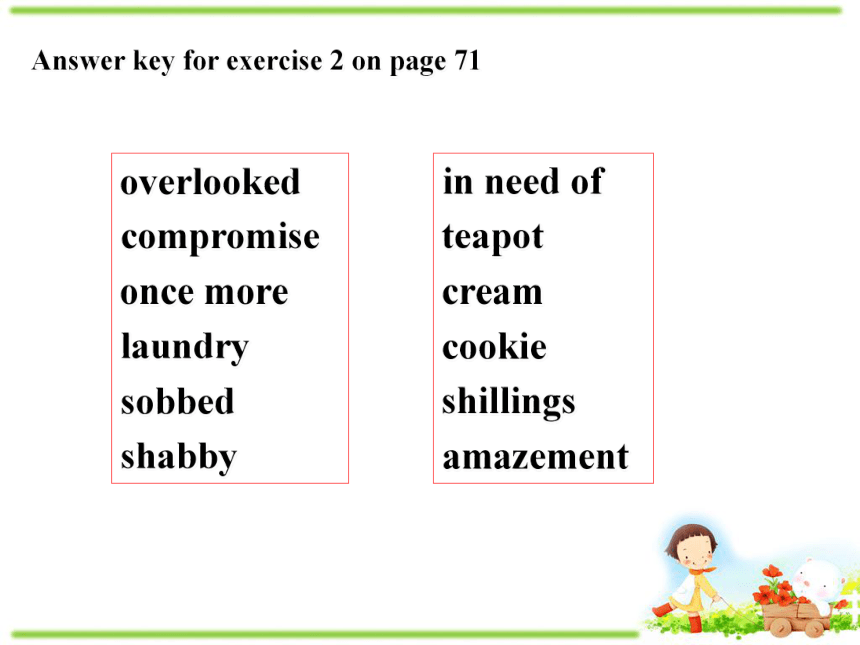
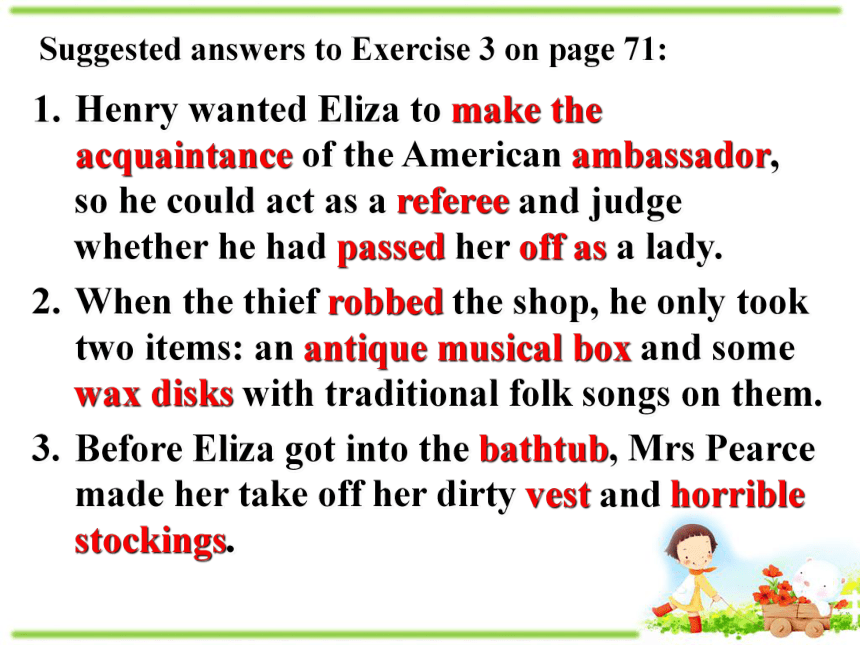
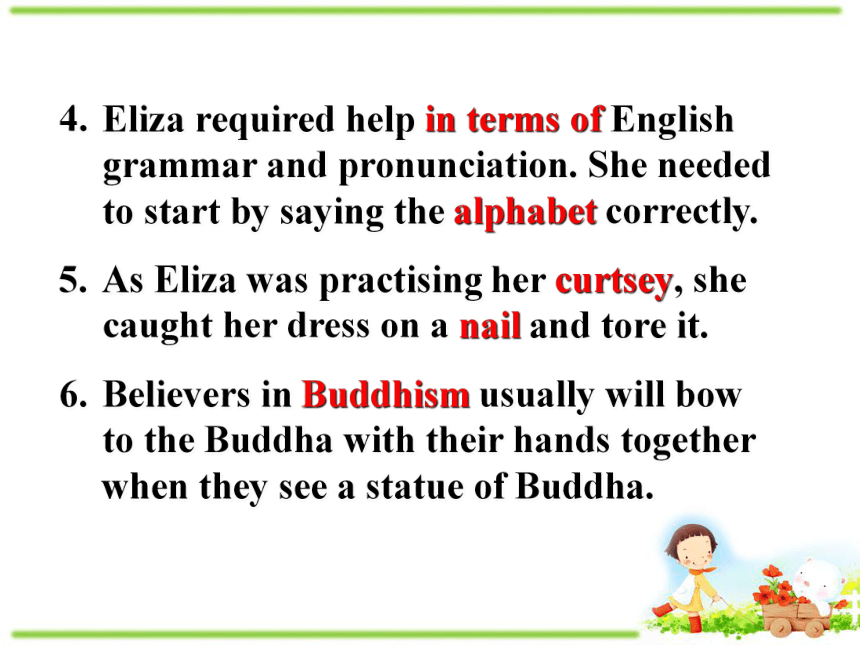
文档简介
课件40张PPT。Unit 4PygmalionWorkbookAct Three Testing Eliza Before you listen to the next part of the play, discuss these questions with a partner.
How would you test Eliza?
What criteria would you use to decide if the test was a success or not?ListeningPage 70Testing ElizaMrs Higgins is not interested in the experiment.
Clara enjoys the new small talk.
Eliza thinks somebody killed her aunt.
Henry is disappointed with how the experiment is going.
Mrs Higgins thinks Eliza can go to the ambassador’s garden party.Read these statements and listen to the tape for the fist time. Then decide whether they are true or false.FFTFFWhy does Freddy laugh at Eliza when she talks about the weather?
Why is Clara confused with Eliza’s use of English?
Why does Henry describe Eliza’s conversation as “the new small talk”?
Do you think Freddy likes Eliza? Why or why not?
Does Mrs Higgins thinks the test is successful? Why or why not?
How does Eliza give herself away?Listen to the tape a second time and answer the following questions.Why does Freddy laugh at Eliza when she talks about the weather?
Why is Clara confused with Eliza’s use of English? He realizes she is using the correct language and talking about suitable subjects but in a language that is like a textbook, which shows she does not understand what she is saying.
Clara is confused with Eliza’s use of English because Eliza is using slang and also talking of subjects not discussed in polite society. Clara would not have heard them discussed before. Henry wants to disguise the fact that Eliza’s language is unsuitable by pretending it is a new and fashionable way to talk.
Freddy makes it clear that he likes Eliza because he sits next to her and wants to walk her home.Why does Henry describe Eliza’s conversation as “the new small talk”?
Do you think Freddy likes Eliza? Why or why not?Mrs Higgins is amused by Eliza but recognizes that she is not yet ready for polite society. Her language is so unsuitable that she would give herself away as not being an authentic English lady.
She gives herself away by the choice of topics and by the language she uses to talk about these topics.Does Mrs Higgins thinks the test is successful? Why or why not?
How does Eliza give herself away?Finish the chart below to help Professor Higgins decide what still needs to be done to turn Eliza into a lady.1 her dress2 her pronunciation3 her manners1 her grammar2 her choice of conversation topics3 her languageUsing words and expressionsEliza has made great improvement ___________ grammar and pronunciation.
Eliza thought her English was ___________ improvement.
Was Mrs Higgins ___________ her son’s experiment?
__________ many difficulties the experiment was a success.in terms ofin need ofin favour ofIn spite ofAnswer key for exercise 1 on page 71Answer key for exercise 2 on page 71overlooked
compromise
once more
laundry
sobbed
shabbyin need of
teapot
cream
cookie
shillings
amazementSuggested answers to Exercise 3 on page 71:Henry wanted Eliza to make the acquaintance of the American ambassador, so he could act as a referee and judge whether he had passed her off as a lady.
When the thief robbed the shop, he only took two items: an antique musical box and some wax disks with traditional folk songs on them.
Before Eliza got into the bathtub, Mrs Pearce made her take off her dirty vest and horrible stockings.Eliza required help in terms of English grammar and pronunciation. She needed to start by saying the alphabet correctly.
As Eliza was practising her curtsey, she caught her dress on a nail and tore it.
Believers in Buddhism usually will bow to the Buddha with their hands together when they see a statue of Buddha.Using structuresAnswer key for exercise 1 on page 72born
Tired
created
Assisted
Changedinformed
connected
Faded
Swept
introducedAnswer key for exercise 2 on page 72Amused by Eliza’s funny “small talk”, Freddy couldn’t help laughing.
Laughed at by Freddy, Eliza felt very angry.
Worn out in the language class, Eliza fell asleep early at night.
Fascinated by Eliza’s charm and beauty, Freedy fell in love with her.
Stared at by all the guests, Eliza felt rather uneasy.
Ignored by Henry Higgins all the time, Eliza decided to leave him.
Very surprised, Henry discovered the next morning that Eliza had gone.Answer key for exercise 3 on page 72Armed
experienced
Concerned
Frightened
Frozen
rooted
Determined
frightened
covered
scared这个团队只带着一盏灯,一些事物和一张地图,在洞穴里寻找那个危险的动物。
他们的队长带路,他在洞穴探险中非常有经验。
考虑到队长的安全,其他队员朝着洞穴望下去。
他们吓坏了,转身正要离开洞穴,可是正在这时,他们听见身后一声低沉的怪声。
他们害怕得僵住了,生根似地站在那里,盯着那动物。他们决定不让那个可怕的猛兽发现队长,于是朝着怪物冲过去,大声喊叫并向它挥动胳膊。
这下轮到那头猛兽害怕了,跑了过去。
几乎同一时刻,他们的队长出现了,全身都是泥,像是另外一只小一点的怪兽。
他们尖叫着,吓得要死。What was the team armed with to search the cave for the dangerous creature?
What happened to the leader in the cave expedition?
What did they hear when they were to turn round to leave the cave?
What was the creature like?
What was the leader like when he appeared again?
What happened to the creature finally?Listening taskPage 73Before listening, read all the exercises and then discuss these questions with you partner. Prepare to share your ideas with the whole class.What is the role of an ambassador?
Why is it important for Eliza to go to an ambassador’s garden party?
How do you think Henry will find out whether Eliza is behaving like a lady or not?The ambassador’s garden partyThe role of an ambassador is to represent his/her government in a foreign country.
It is important because the ambassador’s garden party is an important social occasion and an opportunity for Eliza to prove she can pass off as an upper class lady.
Henry intends to watch the reaction of other people to Eliza. He thinks that will tell him if she is behaving like a lady or not.What is the role of an ambassador?2. Why is it important for Eliza to go to an ambassador’s garden party?3. How do you think Henry will find out whether Eliza is behaving like a lady or notSuggested answers to Exercise 2:He intends to find out who Eliza is and expose her if she is a cheat.Who is Mr Pommuckd?
What is an interpreter?
What does Mr Pommuck intend to do when he sees Eliza?Mr Pommuck is an old pupil of Henry and an interpreter for the ambassador.An interpreter is a person who changes spoken words from one language into another.Henry thinks Mr Pommuck is his best and greatest student.
The ambassador’s wife is impressed by Eliza’s beauty.
Mr Pommuck thinks Eliza speaks the language so perfectly that she must be French.
Eliza enjoys people’s praise and likes to be the centre of attraction.
Henry and Pickering are very proud of Eliza’s “Performance’’ and popularity.Answer key for Exercise 3:FTFFFSuggested answers to Exercise 4:Eliza did not really enjoy the party as it caused her a lot of stress. In particular she didn’t like people staring at her.Does Eliza enjoy the party? Why or why not?Why do Mr Pommuck, the ambassador and his wife Eliza is princess?Does Henry encourage everyone to think she is a princess?They all think Eliza is a princess because she looks beautiful and her English is so good.Henry did not encourage them to think of her as a princess. He wants to make fun of Mr Pommuck for claiming to be able to find social cheats but who did not discover Eliza was a cheat.Warming upReading taskReview of Act 2Act 2 Henry ___ with his friend
Colonel Pickering that
through a change in
dress and speech, he can turn the lower class Eliza into a lady ______________________.
The only thing in the bet
for Eliza is that she might
be able to open her own
flower shop and somewhat ______ her lower class roots.betthat will fool high societyescapeReading II----scanning& skimming (5m)Read the Act and answer the following
questions.1.Why does Eliza collect Henry’s slippers for
him although she is not a servant?
2.Why does she throw the shoes at him?
3.Why does Henry think he won the bet?
4.Why does Eliza get upset when Henry does
not congratulate her?
5.Why does Henry get upset when he hears
Eliza will marry Freddy?1.Why does Eliza collect Henry’s slippers for
him although she is not a servant?
She collects his slippers because she wants to show him she cares about him.2.Why does she throw the shoes at him?
She throws them at him because she realizes he doesn’t care for her.3.Why does Henry think he won the bet?He thinks his teaching is successful.4.Why does Eliza get upset when Henry does
not congratulate her?
She gets upset because she thinks her efforts have been overlooked.5.Why does Henry get upset when he hears
Eliza will marry Freddy?
He gets upset because he really does love to Eliza.Reading II---- detail reading (5m)Fill in the chart.She works hard to win his bet for him.She is disappointed that he does not acknowledge her hard work.She relizes he will only ever think of her as a flower girl.He is overjoyed with his triumph in the bet, but ignores Eliza’s feelings and He is surprised she is upset that he does not congratulate her for her success at the party.He is upset that she is thinking of leaving him and marrying Freddy.In pairs, think about why Bernard Shaw did not end his play happily with Henry marrying Eliza. Remember that the story is based on the Greek tale of Pygmalion even though there is no character called Pygmalion in the play. Bernard Shaw must have had good reasons for giving his play this title. Refer back to page 28 for the story of Pygmalion, then work out the similarities and differences between the play and the story.They are both about a man who “makes” a perfect woman.Both the women benefit: Galatea by becoming alive and Eliza by learning how to behave in polite society.In the story the artist admits that he has fallen in love with the statue, but in the play Henry does not admit that he loves Eliza.
In the story the artist and the statue get married and live happily together, but in the play they do not get married and appear to part.
In the story the artist changes from not liking women to loving one, but in the play Henry does not appear to change as much as Eliza.Does Henry change? Consider these questions.
What does he think of Eliza at the beginning of the play?
What does he think of Eliza at the end of the play?
Has his attitude changed? If yes, how?Now in pairs discuss how the characters change in the play?
Example: Galatea changes from stone into a real person.
Eliza changes from _______________________________ _____________________________________________.
Pygmalion changes from ___________________________ __________________________________. a rough, dirty flower girl who spoke bad English into a beautiful and accomplished lady a man who dislikes women into one who loves one particular womanWhat does he think of Eliza at the beginning of the play?
What does he think of Eliza at the end of the play?
Has his attitude changed? If yes, how?
He thinks Eliza is a rough, dirty flower girl who speaks bad English at the beginning of the play.He thinks that she is beautiful and speaks good English at the end of the play but she is his creation.His attitude has changed. It seems he can’t live without her. He is actually in love with her, but he finds it difficult to show this feeling. He wants her to stay but is not prepared to give her anything that would make her stay.Write a sentence about Henry and how his change or lack of it caused problems for Eliza.
I think Henry has / hasn’t changed because ______ ___________________________________________ _______________________________________.Now use all this information you have gathered about the connection between this story and the play and write a review of the play. First, analyse the play in groups. You may find the following headings useful in your discussion.
What is the theme of the play?
Who are the main characters?
What is the main plot?
What time period is the play set in?After the discussion, decide on the organization of your review. You may have an outline like this:
Paragraph 1: A brief summary of what happens in the play and your general opinion of it.
Paragraph 2: Select one aspect you want to write about ---- the theme, one of the characters, a small scene, the plot development, the language or the writing style and why you choose that aspect.
Paragraph 3: Develop you ideas on the aspect you select.
Paragraph 4: End your review by stating what you have learned or enjoyed about this play.
How would you test Eliza?
What criteria would you use to decide if the test was a success or not?ListeningPage 70Testing ElizaMrs Higgins is not interested in the experiment.
Clara enjoys the new small talk.
Eliza thinks somebody killed her aunt.
Henry is disappointed with how the experiment is going.
Mrs Higgins thinks Eliza can go to the ambassador’s garden party.Read these statements and listen to the tape for the fist time. Then decide whether they are true or false.FFTFFWhy does Freddy laugh at Eliza when she talks about the weather?
Why is Clara confused with Eliza’s use of English?
Why does Henry describe Eliza’s conversation as “the new small talk”?
Do you think Freddy likes Eliza? Why or why not?
Does Mrs Higgins thinks the test is successful? Why or why not?
How does Eliza give herself away?Listen to the tape a second time and answer the following questions.Why does Freddy laugh at Eliza when she talks about the weather?
Why is Clara confused with Eliza’s use of English? He realizes she is using the correct language and talking about suitable subjects but in a language that is like a textbook, which shows she does not understand what she is saying.
Clara is confused with Eliza’s use of English because Eliza is using slang and also talking of subjects not discussed in polite society. Clara would not have heard them discussed before. Henry wants to disguise the fact that Eliza’s language is unsuitable by pretending it is a new and fashionable way to talk.
Freddy makes it clear that he likes Eliza because he sits next to her and wants to walk her home.Why does Henry describe Eliza’s conversation as “the new small talk”?
Do you think Freddy likes Eliza? Why or why not?Mrs Higgins is amused by Eliza but recognizes that she is not yet ready for polite society. Her language is so unsuitable that she would give herself away as not being an authentic English lady.
She gives herself away by the choice of topics and by the language she uses to talk about these topics.Does Mrs Higgins thinks the test is successful? Why or why not?
How does Eliza give herself away?Finish the chart below to help Professor Higgins decide what still needs to be done to turn Eliza into a lady.1 her dress2 her pronunciation3 her manners1 her grammar2 her choice of conversation topics3 her languageUsing words and expressionsEliza has made great improvement ___________ grammar and pronunciation.
Eliza thought her English was ___________ improvement.
Was Mrs Higgins ___________ her son’s experiment?
__________ many difficulties the experiment was a success.in terms ofin need ofin favour ofIn spite ofAnswer key for exercise 1 on page 71Answer key for exercise 2 on page 71overlooked
compromise
once more
laundry
sobbed
shabbyin need of
teapot
cream
cookie
shillings
amazementSuggested answers to Exercise 3 on page 71:Henry wanted Eliza to make the acquaintance of the American ambassador, so he could act as a referee and judge whether he had passed her off as a lady.
When the thief robbed the shop, he only took two items: an antique musical box and some wax disks with traditional folk songs on them.
Before Eliza got into the bathtub, Mrs Pearce made her take off her dirty vest and horrible stockings.Eliza required help in terms of English grammar and pronunciation. She needed to start by saying the alphabet correctly.
As Eliza was practising her curtsey, she caught her dress on a nail and tore it.
Believers in Buddhism usually will bow to the Buddha with their hands together when they see a statue of Buddha.Using structuresAnswer key for exercise 1 on page 72born
Tired
created
Assisted
Changedinformed
connected
Faded
Swept
introducedAnswer key for exercise 2 on page 72Amused by Eliza’s funny “small talk”, Freddy couldn’t help laughing.
Laughed at by Freddy, Eliza felt very angry.
Worn out in the language class, Eliza fell asleep early at night.
Fascinated by Eliza’s charm and beauty, Freedy fell in love with her.
Stared at by all the guests, Eliza felt rather uneasy.
Ignored by Henry Higgins all the time, Eliza decided to leave him.
Very surprised, Henry discovered the next morning that Eliza had gone.Answer key for exercise 3 on page 72Armed
experienced
Concerned
Frightened
Frozen
rooted
Determined
frightened
covered
scared这个团队只带着一盏灯,一些事物和一张地图,在洞穴里寻找那个危险的动物。
他们的队长带路,他在洞穴探险中非常有经验。
考虑到队长的安全,其他队员朝着洞穴望下去。
他们吓坏了,转身正要离开洞穴,可是正在这时,他们听见身后一声低沉的怪声。
他们害怕得僵住了,生根似地站在那里,盯着那动物。他们决定不让那个可怕的猛兽发现队长,于是朝着怪物冲过去,大声喊叫并向它挥动胳膊。
这下轮到那头猛兽害怕了,跑了过去。
几乎同一时刻,他们的队长出现了,全身都是泥,像是另外一只小一点的怪兽。
他们尖叫着,吓得要死。What was the team armed with to search the cave for the dangerous creature?
What happened to the leader in the cave expedition?
What did they hear when they were to turn round to leave the cave?
What was the creature like?
What was the leader like when he appeared again?
What happened to the creature finally?Listening taskPage 73Before listening, read all the exercises and then discuss these questions with you partner. Prepare to share your ideas with the whole class.What is the role of an ambassador?
Why is it important for Eliza to go to an ambassador’s garden party?
How do you think Henry will find out whether Eliza is behaving like a lady or not?The ambassador’s garden partyThe role of an ambassador is to represent his/her government in a foreign country.
It is important because the ambassador’s garden party is an important social occasion and an opportunity for Eliza to prove she can pass off as an upper class lady.
Henry intends to watch the reaction of other people to Eliza. He thinks that will tell him if she is behaving like a lady or not.What is the role of an ambassador?2. Why is it important for Eliza to go to an ambassador’s garden party?3. How do you think Henry will find out whether Eliza is behaving like a lady or notSuggested answers to Exercise 2:He intends to find out who Eliza is and expose her if she is a cheat.Who is Mr Pommuckd?
What is an interpreter?
What does Mr Pommuck intend to do when he sees Eliza?Mr Pommuck is an old pupil of Henry and an interpreter for the ambassador.An interpreter is a person who changes spoken words from one language into another.Henry thinks Mr Pommuck is his best and greatest student.
The ambassador’s wife is impressed by Eliza’s beauty.
Mr Pommuck thinks Eliza speaks the language so perfectly that she must be French.
Eliza enjoys people’s praise and likes to be the centre of attraction.
Henry and Pickering are very proud of Eliza’s “Performance’’ and popularity.Answer key for Exercise 3:FTFFFSuggested answers to Exercise 4:Eliza did not really enjoy the party as it caused her a lot of stress. In particular she didn’t like people staring at her.Does Eliza enjoy the party? Why or why not?Why do Mr Pommuck, the ambassador and his wife Eliza is princess?Does Henry encourage everyone to think she is a princess?They all think Eliza is a princess because she looks beautiful and her English is so good.Henry did not encourage them to think of her as a princess. He wants to make fun of Mr Pommuck for claiming to be able to find social cheats but who did not discover Eliza was a cheat.Warming upReading taskReview of Act 2Act 2 Henry ___ with his friend
Colonel Pickering that
through a change in
dress and speech, he can turn the lower class Eliza into a lady ______________________.
The only thing in the bet
for Eliza is that she might
be able to open her own
flower shop and somewhat ______ her lower class roots.betthat will fool high societyescapeReading II----scanning& skimming (5m)Read the Act and answer the following
questions.1.Why does Eliza collect Henry’s slippers for
him although she is not a servant?
2.Why does she throw the shoes at him?
3.Why does Henry think he won the bet?
4.Why does Eliza get upset when Henry does
not congratulate her?
5.Why does Henry get upset when he hears
Eliza will marry Freddy?1.Why does Eliza collect Henry’s slippers for
him although she is not a servant?
She collects his slippers because she wants to show him she cares about him.2.Why does she throw the shoes at him?
She throws them at him because she realizes he doesn’t care for her.3.Why does Henry think he won the bet?He thinks his teaching is successful.4.Why does Eliza get upset when Henry does
not congratulate her?
She gets upset because she thinks her efforts have been overlooked.5.Why does Henry get upset when he hears
Eliza will marry Freddy?
He gets upset because he really does love to Eliza.Reading II---- detail reading (5m)Fill in the chart.She works hard to win his bet for him.She is disappointed that he does not acknowledge her hard work.She relizes he will only ever think of her as a flower girl.He is overjoyed with his triumph in the bet, but ignores Eliza’s feelings and He is surprised she is upset that he does not congratulate her for her success at the party.He is upset that she is thinking of leaving him and marrying Freddy.In pairs, think about why Bernard Shaw did not end his play happily with Henry marrying Eliza. Remember that the story is based on the Greek tale of Pygmalion even though there is no character called Pygmalion in the play. Bernard Shaw must have had good reasons for giving his play this title. Refer back to page 28 for the story of Pygmalion, then work out the similarities and differences between the play and the story.They are both about a man who “makes” a perfect woman.Both the women benefit: Galatea by becoming alive and Eliza by learning how to behave in polite society.In the story the artist admits that he has fallen in love with the statue, but in the play Henry does not admit that he loves Eliza.
In the story the artist and the statue get married and live happily together, but in the play they do not get married and appear to part.
In the story the artist changes from not liking women to loving one, but in the play Henry does not appear to change as much as Eliza.Does Henry change? Consider these questions.
What does he think of Eliza at the beginning of the play?
What does he think of Eliza at the end of the play?
Has his attitude changed? If yes, how?Now in pairs discuss how the characters change in the play?
Example: Galatea changes from stone into a real person.
Eliza changes from _______________________________ _____________________________________________.
Pygmalion changes from ___________________________ __________________________________. a rough, dirty flower girl who spoke bad English into a beautiful and accomplished lady a man who dislikes women into one who loves one particular womanWhat does he think of Eliza at the beginning of the play?
What does he think of Eliza at the end of the play?
Has his attitude changed? If yes, how?
He thinks Eliza is a rough, dirty flower girl who speaks bad English at the beginning of the play.He thinks that she is beautiful and speaks good English at the end of the play but she is his creation.His attitude has changed. It seems he can’t live without her. He is actually in love with her, but he finds it difficult to show this feeling. He wants her to stay but is not prepared to give her anything that would make her stay.Write a sentence about Henry and how his change or lack of it caused problems for Eliza.
I think Henry has / hasn’t changed because ______ ___________________________________________ _______________________________________.Now use all this information you have gathered about the connection between this story and the play and write a review of the play. First, analyse the play in groups. You may find the following headings useful in your discussion.
What is the theme of the play?
Who are the main characters?
What is the main plot?
What time period is the play set in?After the discussion, decide on the organization of your review. You may have an outline like this:
Paragraph 1: A brief summary of what happens in the play and your general opinion of it.
Paragraph 2: Select one aspect you want to write about ---- the theme, one of the characters, a small scene, the plot development, the language or the writing style and why you choose that aspect.
Paragraph 3: Develop you ideas on the aspect you select.
Paragraph 4: End your review by stating what you have learned or enjoyed about this play.
